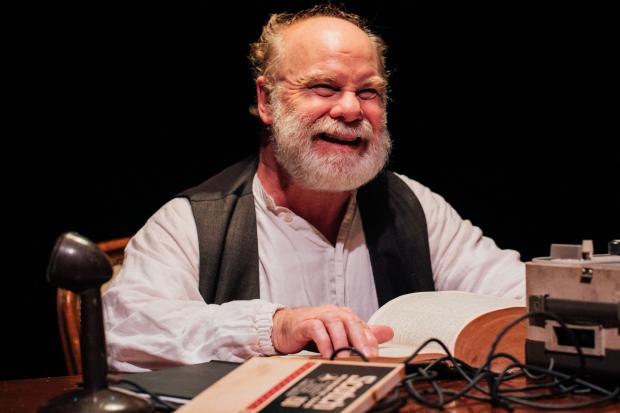Advertisement
The Actors’ Gang’s One Act Festival includes a show featuring two one-act plays by 20th century maestros of the avant-garde stage. Irish bard Samuel Beckett was a pioneer of the Theatre of the Absurd and best known for his late 1940s masterpiece Waiting for Godot. Written and performed about a decade later, Krapp’s Last Tape is a one-hander starring the ineffable Steven M. Porter, a 30-year stalwart of The Gang.
To capture the absurdist quality of Beckett’s approximately 45 minute one-acter, Porter deftly deploys drollery, sight gags, pratfalls and the like that seem to be derived from silent screen slapstick comedies by Fatty Arbuckle (I mean ROSCOE!), Charlie Chaplin, etc. Indeed, if it seems that it sounds farfetched that the sophisticated, Nobel Prize-winning Samuel would be deeply influenced by those funny vintage flicker shows, consider the fact that what appears to be the only movie Beckett wrote the screenplay specifically for was 1965’s experimental short Film, which starred none other than silent cinema’s Great Stoneface, comic genius Buster Keaton. (See my review at: https://www.peoplesworld.org/article/film-and-notfilm-playwright-samuel-beckett-meets-buster-keaton/.)
Porter, who played a wickedly witty bad Santa in The Gang’s 2018 Aphrodite’s Holiday Show, expertly transmits his humorous sensibility to Krapp’s with great panache. However, he also brings a tragic sensitivity to the role, which seems to be of an old man reviewing his squandered life. As Beckett’s title indicates, like the National Security Agency, the perhaps perfectly monikered Krapp has “surveilled” his own life, making audio dossiers of various episodes of his misbegotten, possibly wasted existence. Ensconced at a desk Krapp plays from reels of tapes on an ancient tape recorder. A Gang staffer assured me the dialogue on the tapes actually emanated from the hoary reel-to-reel machine and the spools - a word Krapp has much fun with - Porter’s character plays. Perhaps this touch is owing to the wizardry of technical director Josh Keh, as well as helmer Cynthia Ettinger, along with Porter’s expertise.
During the intermission at the well-attended Thursday night production I had an opportunity to ask Porter, if, as he seemed to be, he was enjoying himself while clowning on the mostly bare set. The veteran thespian’s reply surprised me a bit, as he admitted to not only having fun during his tomfoolery on the boards, but even during those moments of Beckett-ian anguish and longing.
Like Krapp’s Last Tape the second one-act play on the bill is also a meditation on the meaning of existence. Since reading No Exit many moons ago at Hunter College I have always wanted to see it staged, and courtesy of The Gang my longtime wish finally came true - and it has been well worth the wait. No Exit is by French novelist and playwright Jean-Paul Sartre, who - unlike Beckett - may be best remembered as a philosopher and public intellectual. Both Krapp’s and No Exit express the philosophy of existentialism, which as I wrote in my 2017 review of Beckett and Keaton’s Film is:
“a bleak view of humanity that would have been called ‘existential’ back in the days when the playwright[s] lived in a Paris where beret-clad, Gauloises-puffing, baguette-gobbling philosophes debated ‘what it’s all about’ in cafés incorporating the benign indifference of the cosmos. (Oddly, today, in a bizarre vocab rehab interchange that could be dialogue in a Beckett play, the word ‘existential’ refers to when a state’s existence is militarily threatened.)”
[NOTE: PLOT SPOILER ALERT!]
No, No Exit is not about Brexit (Britain’s torturous odyssey to leave the European Union via Brexit). No Exit is really a guided tour of what hell is actually like, as a punctilious punk of a Valet (Cihan Sahin has lots of fun lampooning concierges at grand hotels with mirth-making contagion) shows three new arrivals their confined quarters (minus amenities such as mirrors and toothbrushes) in the underworld.
Cradeau (the goateed Pierre Adeli) is a journalist accused of cowardice as World War II dawns. The blonde Estelle (Paulette Zubata) is a beautiful, sexy young woman who has been cut down before her time.
As Inez, in our 2019 context, Hannah Chodos may have a thankless task as Inez, a lesbian. Perhaps when Sartre premiered No Exit in 1944, there was something daring, even liberating about presenting an out-of-the-closet gay character lusting after a same sex lover, as Inez does with the attractive Estelle. However, here and now, some may perceive Inez negatively as an LGBTQ cock block preventing the presumably heterosexual Cradeau and Estelle from satisfying their lust and love - and for all eternity, at that, the unhappy trio imprisoned in their windowless quarters for the rest of time with only one another as cellmates/soulmates.
The Gang’s Vanguard Member, Brian T. Finney, expertly, peerlessly directs his ensemble in this hour-plus one-acter. It is the journalist Cradeau, but of course, who delivers the play’s immortal line, which I won’t spoil here, but is arguably to 20th century theatre what Shakespeare’s “To be or not to be, that is the question…” was to the 17th century Elizabethan stage.
In addition to sharing an existential sensibility, both Krapp’s Last Tape and No Exit ruminate on the role of love and sexuality in the equation of what makes us, after all, fully human. But in any case, allow your humble scribe to make one amendment to Sartre’s bone chilling observation about human nature that I’ve never forgotten towards the end of his excursion into Hades: As The Actors’ Gang once again proves, HEAVEN can be other people, too. Bravo!
The Actors’ Gang’s One Act Festival, Krapp’s Last Tape & No Exit plays through April 20 at the Ivy Substation, 9070 Venice Blvd., Culver City, CA 90232. For ticket details see: https://theactorsgang.com/2019/02/one-act-festival-the-classic/ . For more info: (310)838-GANG; http://theactorsgang.com/.
L.A.-based reviewer/historian Ed Rampell co-authored the third edition of “The Hawaii Movie and Television Book” available at: https://mutualpublishing.com/product/the-hawaii-movie-and-television-book/ .


